Brain Based Curriculum
Brain-Based Curriculum
Every activity we perform, riding a bicycle, driving a car, playing soccer, all have specific brain skills associated with them. When we first practice these activities, there is a lot of conscious effort in carrying out the individual skills involved. Eventually, the brain skills become automatic as they are shifted into the subconscious for automatic processing. That is when the activity suddenly becomes second nature.
A struggling reader is working consciously to sound out letters and blend them together thus draining all his or her effort in the act of reading. There is not enough mental stamina left-over to comprehend the ideas that were read. Rehearsal or repetition is just not enough.
When the brain skills involved in learning are not automatic, comprehension, memory and performance suffer. Grounds for successful learning involve strong and spontaneous brain skills unique to each academic subject. Here is a brief list of essential brain skills that are targeted to improve each student’s academic competence and made proficient through LEA’s proprietary brain-based curriculum.

Vital Brain Skills Needed for Decoding and Encoding (Reading/Spelling)
- Auditory Attention: The ability to focus on specific sounds and process them accurately plays an essential role in reading and spelling.
- Auditory Analysis: The ability to determine the sounds that are within a word and the sequence of those sounds requires analysis that does not come easily for everyone.
- Auditory Processing: It is the ability to analyze, blend, and segment sounds. What the brain does with the
- Auditory Discrimination: The ability to hear and analyze differences between sounds allows students to blend and spell with accuracy.
- Auditory Segmenting: A student must be able to segment a word into its individual sounds to spell effectively.
- Auditory Blending: The ability to blend individual sounds to form words is the cornerstone of phonics but is often a deficit area for students with a reading disorder.
Vital Brain Skills Needed for Reading Comprehension
- Selective Attention: Difficulties with reading comprehension is often the result of poor focus as the reader gets effortlessly preoccupied by external or internal distractions.
- Long Term Memory: A student’s “knowledge bank” involves the storage and retrieval of information learned. Long term memory is crucial to overall learning as well as comprehension since we rely on our previous learning and experience to make sense of the world.
- Visual Processing: Reading comprehension and math word problems rely heavily on the student’s ability to form clear and precise pictures of concepts. A student needs to be able to see the whole picture in order to grasp the whole concept.
Vital Brain Skills Needed for Listening, Understanding and Following Instructions
- Processing Speed: The ability to listen, understand, and follow through with step by step instructions is swayed by a student’s thinking speed. Slow thinking speed makes it difficult to keep up as the student is constantly playing catch-up. Thinking speed that is too fast however, contributes to unnecessary impulsive mistakes including overlooking important details.
- Sequential Processing: The ability to process information sequentially is a key element in being able to follow step by step instructions.
- Short Term Memory: The ability to temporarily store and manage information is required to carry out complex cognitive tasks such as learning, reasoning, and comprehension.
Vital Brain Skills Needed for Mathematics
- Working Memory: Working memory requires a conscious effort to hold information just long enough to solve a problem. It is essential for mental math, reading comprehension, remembering details while organizing a plan. Since it is easily influenced by distractions, a fragile working memory is often associated with deficits in attention.
- Visual Discrimination: The ability to discern differences between objects including size, shape, color, distance, and orientation of objects, as well as the ability to discriminate items from a background. Visual discrimination plays a key role in geometry, architecture and design. It also is involved in reading as it lets us see that “was” and “saw” are different even though they have the same letters.
Vital Brain Skills Needed in Problem Solving
- Executive Functioning: It refers to a set of processes having to do with managing oneself and one’s resources in order to achieve a goal. It is the ability to plan and organize.
- Logic and Reasoning: Beyond simple rote memory of facts, the ability to use one’s logic and reasoning to draw conclusions from facts allows for a more in-depth learning.
- Sustained Attention: The ability to stay focused for an extended time.
Learn More About Our Elite Private School
Complete this form and an Admissions Team member will reach out to you shortly.

